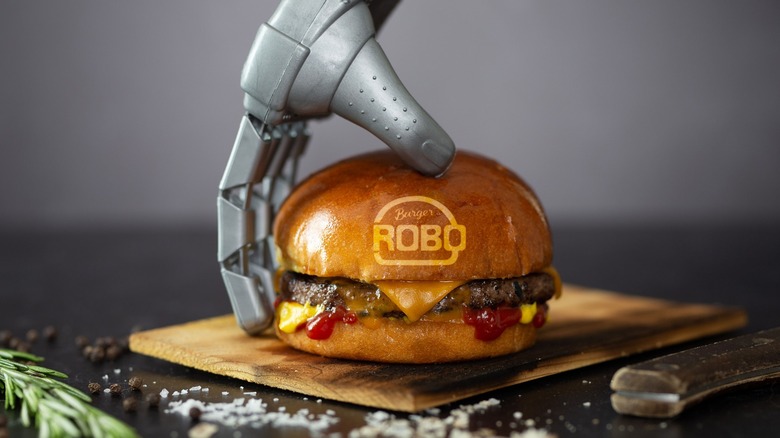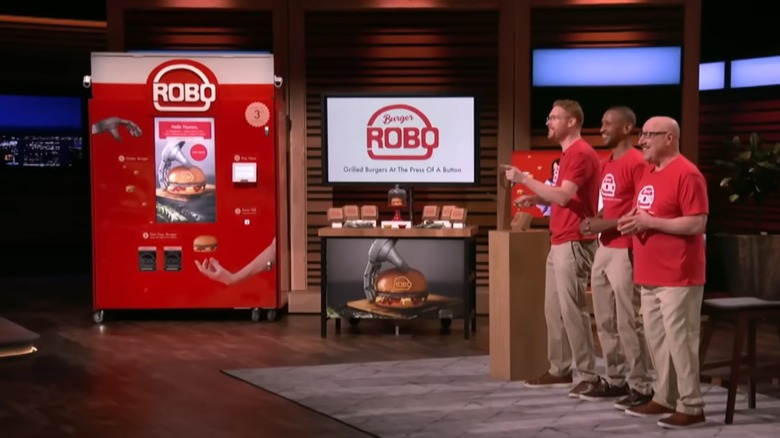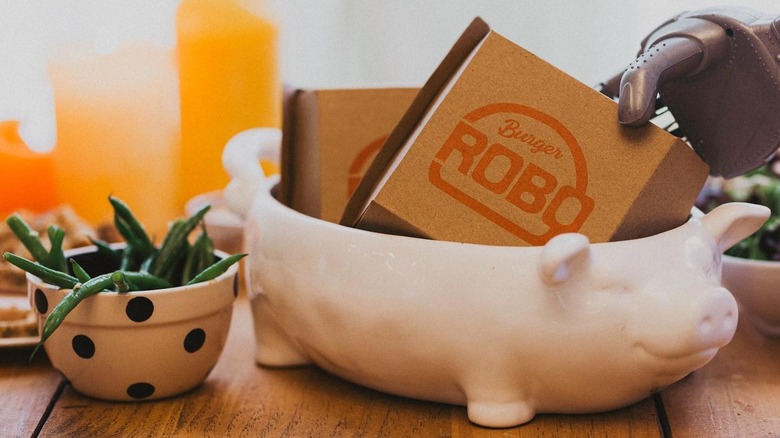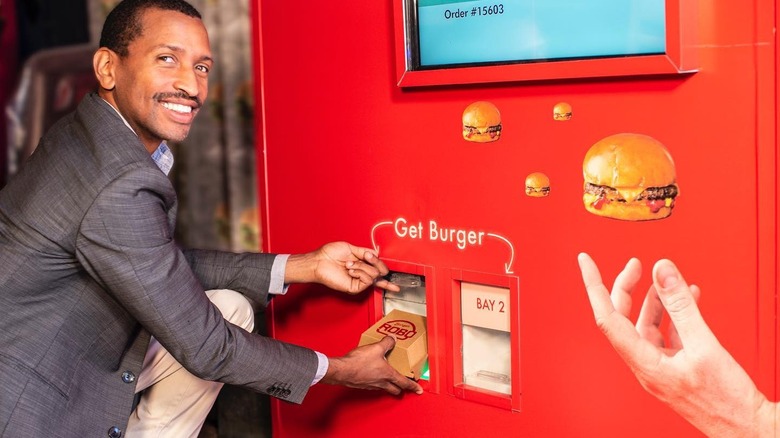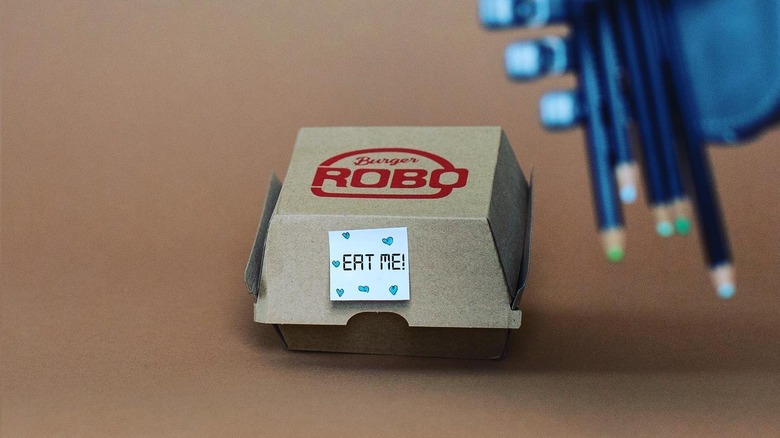RoboBurger: Here's What Happened After Shark Tank
Many innovative technologies debut on "Shark Tank," but few blend automation and gastronomy quite like the RoboBurger. Founded by entrepreneur Andy Siegel, chemical and biochemical PhD roboticist Dan Braido, and data scientist turned inventor Audley Wilson, the company is ushering in a new wave of food vending with one of America's most beloved bites.
The RoboBurger machine operates within a 12-square-foot box, requiring only an electrical hookup. It prepares burgers with cheese, ketchup, and mustard, with the exact combination customizable. The cooking process takes just four minutes, toasting the bun and giving the pre-cooked beef a second round of cooking. Payment is simple, with a variety of tap-to-pay options accepted.
A fresh burger at the press of a button is indeed an impressive sight. What began as Wilson's childhood dream became a reality in 2019, when RoboBurger was officially founded. By 2022, the team had secured millions in startup investments and filed five patents. In 2024, RoboBurger appeared on "Shark Tank," seeking to further scale its business and bring its made-to-order burger machines to more locations.
What happened to RoboBurger on Shark Tank?
All three co-founders — Audley Wilson, Dan Braido, and Andy Siegel — appeared in Episode 21, Season 15 of "Shark Tank." Presenting on the show proved challenging, with the team struggling to clearly explain their business model amidst frequent interruptions from the Sharks. They opened by asking for $1.5 million for 5% equity, valuing the company at $30 million.
Eventually, they clarified that revenue came either from leasing each machine at $3,000 per month or selling the technology outright for an undisclosed sum. These costs did not include the food itself, but RoboBurger promised to connect clients with distributors. During the Beta period, burgers sold for $5.99 to $6.99 each, with a wholesale cost of $2.25.
While the Sharks enjoyed the burgers, most were unconvinced by the business model. Mark Cuban was especially critical, pointing to the expense of vending machines and the oversaturation of food tech. Once the team revealed their substantial projected losses, a deal seemed unlikely.
Then, in a last-minute turn, Wilson asked for help financing machine production. Guest Shark Michael Rubin, who had already dropped out, swiftly re-entered with an offer: a $1.5 million loan specifically for manufacturing, in exchange for a 10% stake. Kevin O'Leary — known as Mr. Wonderful — liked the structure and proposed splitting the deal — $750,000 each for 5% equity apiece. After tense negotiations, the founders agreed, giving 9% of RoboBurger to the two investors.
RoboBurger after Shark Tank
It remains unclear whether Kevin O'Leary and Michael Rubin ultimately closed the deal. Regardless, RoboBurger continued refining its technology, achieving notable milestones. According to LinkedIn, the machine passed gas emissions tests, allowing indoor grilling without dedicated ventilation. It also became the first hot vending technology to earn the National Sanitation Foundation's highest safety and sanitation rating (per Linkedin). These innovations culminated in the fifth version of the RoboBurger model (per LinkedIn).
During this period, the RoboBurger machines also entered the market, appearing in American cities such as Lawrenceburg, Indiana; Atlanta, Georgia; and St. Louis, Missouri, most often in casinos. Meanwhile, the team toured conventions and conferences, showcasing the technology to potential partners and customers. By the time its "Shark Tank" episode aired in April 2024, the company had already produced 12,000 burgers in 18 months and projected about $1.4 million in annual revenue by the end of the year. While precise post-filming figures are unavailable, it's clear the technology continued to evolve.
Is RoboBurger still in business?
As of 2025, RoboBurger still operates with all three founders involved. In a prominent new development, the company has formed a partnership with fellow tech entrepreneurs Sweet Robo. Piny Vind, CEO of Sweet Robo, now serves as the company's new president. Backed by revenue growth leader Dennis A. Branch, RoboBurger has entered an ambitious new era. The main goal of the collaboration is to scale the machines and establish automated burger manufacturing in new markets.
Although the names are similar, Sweet Robo and RoboBurger were previously unrelated companies. Sweet Robo previously specialized in cutting-edge vending machines in the dessert space, producing nearly a dozen models that dispensed treats such as cotton candy, ice cream, and lollipops, all presented in a playful, eye-catching display. The merger is a logical fit, as the partnership with RoboBurger not only extends Sweet Robo's reach into the savory space, but also introduces hot food service, a key component of RoboBurger's original vision to make quality meals more widely accessible.
What's next for RoboBurger?
Because the merger is recent, RoboBurger's next steps remain uncertain. The original company website has gone offline, including its leasing and purchasing portal — likely indicating a temporary suspension of sales. However, RoboBurger now appears on Sweet Robo's homepage, and a LinkedIn post from July 2025 confirms the machine is undergoing a redesign. Sweet Robo plans to refine both its appearance and operation, targeting high-traffic venues such as airports, arenas, and malls.
This move places RoboBurger squarely in a growing lineage of innovative, automated companies featured on "Shark Tank." While RoboBurger aims to use its technology to make restaurant-quality food more widely accessible, other alumni have pursued similar goals in different sectors. For example, Chefee Robotics is developing an automated chef for the home kitchen, and Nourish + Bloom Market's mission is to use automated grocery stores to combat food deserts by providing access to fresh, nutritious food.
While no launch date has been announced as of August 2025, RoboBurger's future looks promising. Soon, you may be able to enjoy a robot-made all-American cheeseburger in a location near you — though considering its plans for eventual international expansion, that signature dish may also be coming to a location abroad, perhaps alongside other automated dishes as well.

